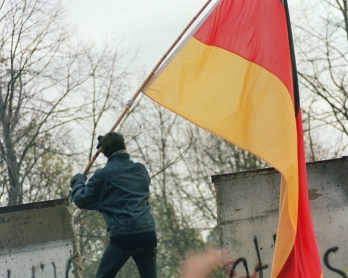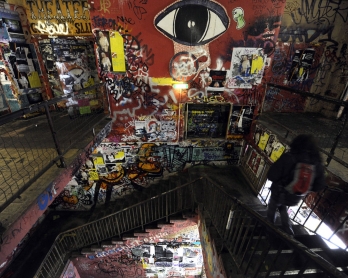Stuck at home with the kids as History rushes by
Berlin —We had the same ritual at AFP’s East Berlin bureau every day. Around 8:30 am, Charles-Henri Baab, the bureau chief, would emerge in a bathrobe from the part of the vast apartment that served as his living quarters. “Anything happening?” he would ask me.
Most of the time, the only thing I had to tell him was the latest monologue by a member of East Germany’s communist politburo, or the latest newspaper article on an ‘economic miracle’ in the German Democratic Republic (GDR), delivered to us in reams of paper spit out by the country’s official news agency or a government daily.
It was rare to find anything interesting in the state-controlled press, which I picked up every day as I arrived at the bureau at 8 am. We had a single telephone line, but it was fickle and bugged by the Stasi secret police. You had to catch just the right moment to get a dial tone. The reporter stationed in the bureau would often go to West Berlin to make his phone calls.
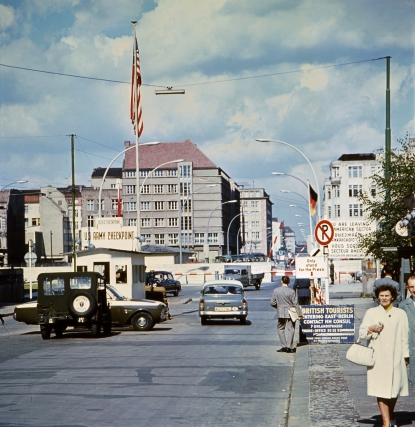 Checkpoint Charlie, between East and West Berlin, June 1968. (AFP)
Checkpoint Charlie, between East and West Berlin, June 1968. (AFP)Most of the stories that we dealt with in the 1980s, when I started working for AFP dealt with sport. East Germany was one of the leading sporting nations in the Soviet bloc that — thanks in large part to doping — produced a range of stars in swimming and track and field.
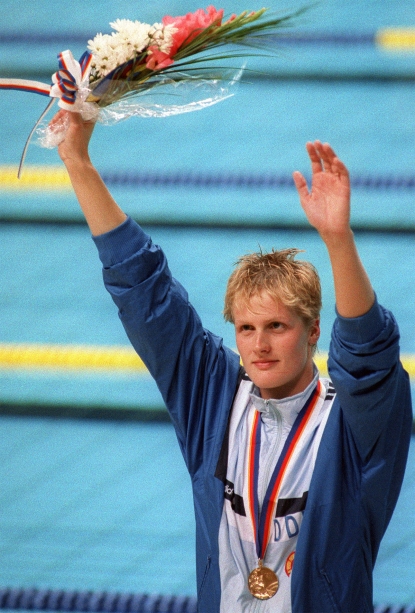 Kristin Otto of East Germany waves to the fans from the podium 25 September 1988 in Seoul after winning the 50m freestyle final, her sixth gold medal of the Olympics Games, clocking a new Olympic record of 25.49 sec. (AFP / Brian Smith)
Kristin Otto of East Germany waves to the fans from the podium 25 September 1988 in Seoul after winning the 50m freestyle final, her sixth gold medal of the Olympics Games, clocking a new Olympic record of 25.49 sec. (AFP / Brian Smith)This bland existence hummed along until the fall of 1989, when demonstrations against the regime began in Leipzig and gradually spread to East Berlin.
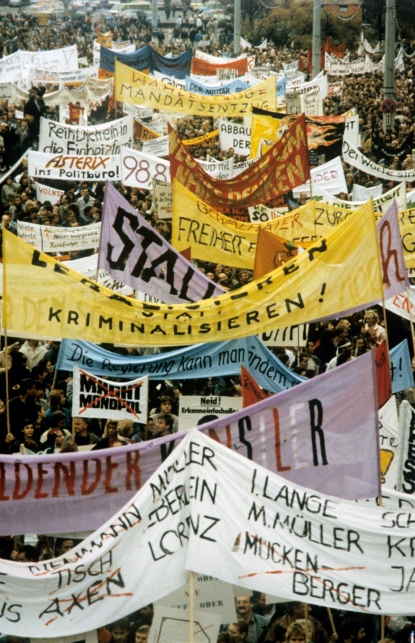 A picture taken on October 2, 1989 shows people in Leipzig demonstrating to demand changes from the GDR government. (AFP / -)
A picture taken on October 2, 1989 shows people in Leipzig demonstrating to demand changes from the GDR government. (AFP / -)The protests were fuelled by Soviet leader Mikhail Gorbachev’s policies of perestroika and glastnost, that fired up similar unrest elsewhere behind the Iron Curtain. During the demonstrations marking GDR’s 40th anniversary, the crowd appealed to Gorbachev — “Gorbi, help us!” By November, the entire country was simmering.
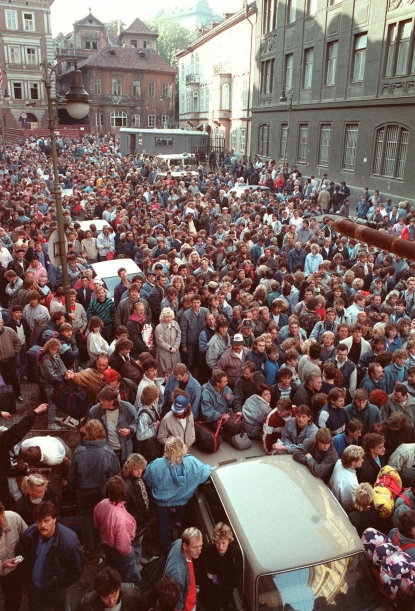 East-German refugees penned behind barriers outside the West German embassy wait for the buses to take them to the railway station to leave Prague 04 October 1989. (AFP / Pascal George)
East-German refugees penned behind barriers outside the West German embassy wait for the buses to take them to the railway station to leave Prague 04 October 1989. (AFP / Pascal George)At the bureau, the sleepy ambiance changed into a more tense, exciting one, especially when we got to report on actual news, like the departure of Erich Honecker from power.
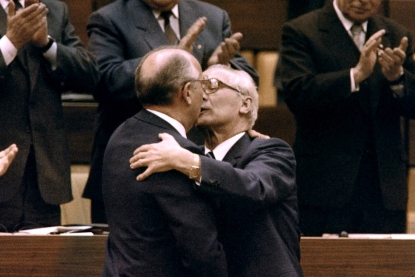 Soviet leader Mikhail Gorbachev, 55, (left) embraces Erich Honecker, hardline communist and general secretary of the Communist Party (SED) as members of SED applaud during the 11th SED party's congress, on April 17, 1986 in East Berlin. (AFP / Wieseles)
Soviet leader Mikhail Gorbachev, 55, (left) embraces Erich Honecker, hardline communist and general secretary of the Communist Party (SED) as members of SED applaud during the 11th SED party's congress, on April 17, 1986 in East Berlin. (AFP / Wieseles)On November 9, 1989, nothing special was cooking and I left the bureau around 4 pm, as usual.
The furthest thing from my mind was the Berlin Wall a few kilometers away. I had lived behind it most of my life — I was only six when it went up literally overnight in 1961 splitting the city in half and separating families and friends — and I saw it every day when I went to get my daughter from daycare when she was young. I had lived behind it, went to university behind it, married and had two kids behind it.
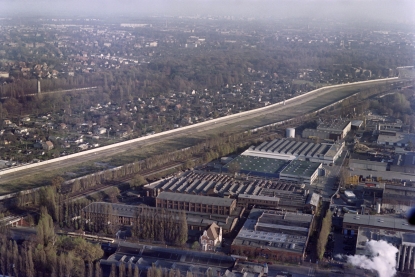 Aerial view taken on November 17, 1989 of the Berlin Wall along the french area in West Berlin and the no man's land marking the border between East and West Berlin. (AFP / Gerard Malie)
Aerial view taken on November 17, 1989 of the Berlin Wall along the french area in West Berlin and the no man's land marking the border between East and West Berlin. (AFP / Gerard Malie)It may seem strange now, but we managed to lead our lives in GDR. When you don’t know what you’re missing, it’s not that bad. We knew what we had a right to do and we avoided expressing our opinion in public.
By early November 1989, the discontent rumbling in the country was all that we and our circle of friends and acquaintances talked about. We realized that something was happening and kept talking about how things would evolve. But never in our wildest dreams did we think that the country that we had lived in, the hardline regime behemoth, would just collapse.
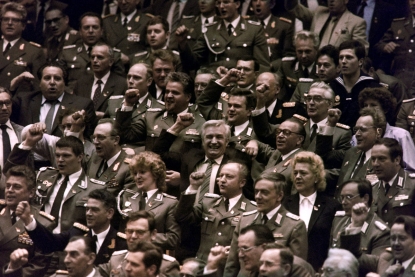 The members of the East German army applaud and wave their fists during the 11th Communist Party (SED) congress, on April 17, 1986 in East Berlin as they listen to Mikahil Gorbachev. (AFP / Wieseles)
The members of the East German army applaud and wave their fists during the 11th Communist Party (SED) congress, on April 17, 1986 in East Berlin as they listen to Mikahil Gorbachev. (AFP / Wieseles)So on November 9, I was at my house with my husband and my 7- and 9-year-old, as I was every evening. Around 7 pm Guenter Schabowski, a member of the GDR politburo, gave his press briefing, a daily dull and drab affair. Except that on this particular day he suddenly announced that East Germans were now free to travel to the western part of the country. Effective immediately.
The announcement stunned the journalists. Our Bonn correspondent, Luc de Barochez, who had come to help with coverage of the protests along with other AFP reporters, was covering the presser and rushed back to the bureau. It promised to be a long night of work — East Germans would be able to cross into the West freely for the first time in 28 years! — but still no-one suspected the full consequences of that announcement. I don’t think anyone at that point actually thought the Wall would fall that night.
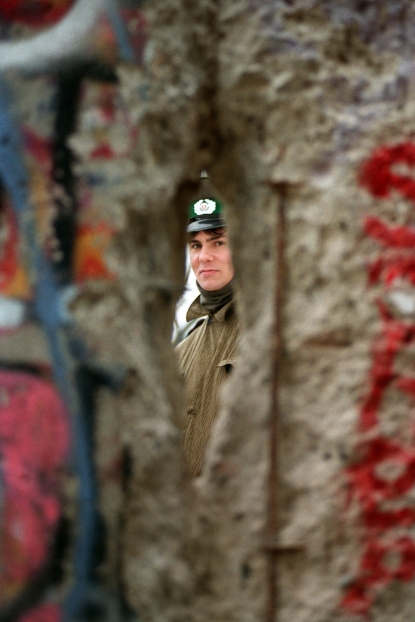 An East German policeman (Vopo) looks through a hole made in the Berlin Wall next to the Brandebourg Gate, on November 21, 1989. (AFP / Gerard Malie)
An East German policeman (Vopo) looks through a hole made in the Berlin Wall next to the Brandebourg Gate, on November 21, 1989. (AFP / Gerard Malie)Meanwhile, I was blissfully unaware of the news at all as I put my kids to bed. You have to remember that there was no Internet and no cell phones back then. So I only learned of the news when I turned on the television, probably after 10 pm as was our custom. The announcement was the top story on the West Germany television, which we watched religiously.
My husband and I were dumbfounded as we watched the scenes unfolding so close to our house on TV — thousands of East Germans has rushed to the checkpoints and after some uncertainty, all of a sudden the checkpoints were open and they could just pass through — without papers, without interrogation — to cheers, flowers and sparkling wine from West Berliners on the other side.
It was a somewhat surreal scene at our house — History was happening a few kilometers away, but we couldn’t go witness the momentous moment. The kids were asleep and there was no question of leaving them alone in the house to go take a tour of West Berlin…
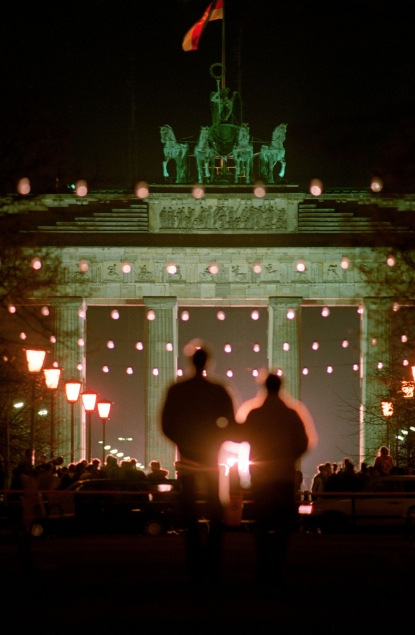 A couple of East Germans watches the Brandenburg Gate 15 November 1989 as hundreds of East and West Berliners gathered at the Unter den Linden avenue in East Berlin in hope that the crossing point under the gate will open soon following the opening of the Berlin Wall on November 09, 1989. (AFP / Patrick Hertzog)
A couple of East Germans watches the Brandenburg Gate 15 November 1989 as hundreds of East and West Berliners gathered at the Unter den Linden avenue in East Berlin in hope that the crossing point under the gate will open soon following the opening of the Berlin Wall on November 09, 1989. (AFP / Patrick Hertzog)The next day, I came to work to a changed office in a changed land. Correspondents flooded in from throughout the AFP network. I specifically remember one, Frederic Bichon, who flew in on the first plane from Bonn the following day. He never did make it back to Bonn — a colleague in the bureau ended up organizing his move to East Berlin.
My days of monitoring the dreary East German press were over. The years that I spent compiling archives from it and the Western German outlets now came in handy as I helped reporters with stories by giving them contacts, suggesting places and ideas.
I finally made it to West Berlin two days later, on Saturday, November 11, along with tens of thousands of other East Germans. My father-in-law had come 200 kilometers, from Halle, for the occasion. Kids back then had school on Saturdays, but my daughter’s class was nearly empty — only two pupils showed up. Seemed like all of East Germany had gone to the other side of the Wall.
At the time, each East German got a welcome present from West Germany — 100 deutschmarks (about 50 euros) per adult and 50 marks per child. We spent our money on a VCR. I remember my little boy in awe of all the things on sale in the shops in the west of the city. He just couldn’t understand why we couldn’t buy everything for him.
All that November, people kept coming to visit us from all over the GDR, friends who wanted to see West Berlin. Euphoria reigned all around.
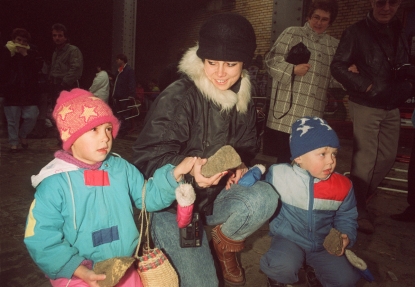 An East German mother and her two children holding pieces of the Berlin Wall cross the border line at Wollangstrasse where a new crossing point into the West has been opened 13 November 1989 as a result of the opening of the Berlin Wall on November 09, 1989. (AFP / Patrick Hertzog)
An East German mother and her two children holding pieces of the Berlin Wall cross the border line at Wollangstrasse where a new crossing point into the West has been opened 13 November 1989 as a result of the opening of the Berlin Wall on November 09, 1989. (AFP / Patrick Hertzog)And then slowly, step by step, the euphoria retreated and the difficulties of our new life became more and more apparent. We had to learn so many new things. Having lived behind the Iron Curtain all our lives, we didn’t know a lot of elementary things that people in the West took for granted. One of the most difficult was the choices now offered to us. When you’ve lived all your life with just one savings bank, one insurance company, it is overwhelming to suddenly have to choose one from a sea of options.
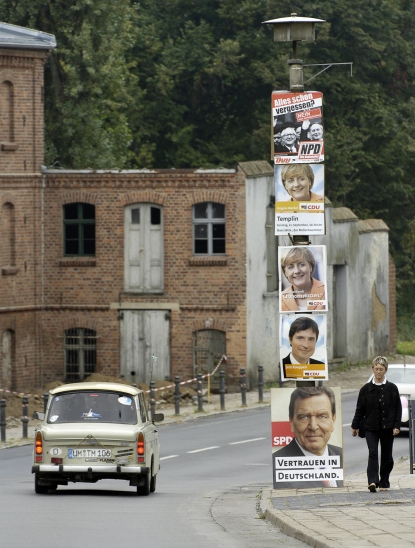 Options abound in a new land -- a Trabant, the main car used in former GDR, drives past billboards representing the different candidates for the upcoming German general elections 11 September 2005 in a street of Templin. (AFP / Eric Feferberg)
Options abound in a new land -- a Trabant, the main car used in former GDR, drives past billboards representing the different candidates for the upcoming German general elections 11 September 2005 in a street of Templin. (AFP / Eric Feferberg)The state-run East German economy and all the inefficiencies that came with it quickly imploded and a lot of people lost their jobs. I was one of the lucky ones who didn’t.
I began to work for AFP in 1984, thanks to my language skills. In East Germany, you didn’t choose your studies — so I couldn’t pick which languages to study and was assigned Russian and French. But as I had an uncle who lived in the West, I was prohibited from travelling there — too much of a risk that I wouldn’t come back.
Since I was an interpreter who couldn’t work abroad, I was funnelled to an institution that was a subsidiary of the foreign affairs ministry and that provided personnel to foreign organizations, which weren’t allowed to look for local staff on their own.
I had some memorable assignments. Once, I found myself replacing the Ecuadorian ambassador during his holidays… without speaking a word of Spanish. I also worked at the embassies of Guinea Bissau, Belgium and Tunisia and an Italian bank before being hired by AFP, which wanted someone to answer phones and monitor the news.
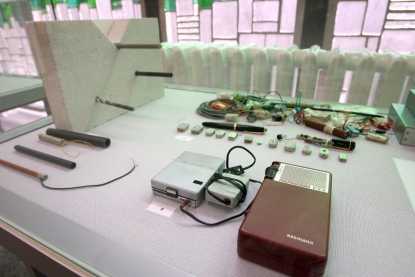 Bugging equipment used by the STASI is on display at the documentation centre of the former east Germany's Ministry for State Security, better known by its acronym STASI, in Berlin 07 November 2006. (AFP / John Macdougall)
Bugging equipment used by the STASI is on display at the documentation centre of the former east Germany's Ministry for State Security, better known by its acronym STASI, in Berlin 07 November 2006. (AFP / John Macdougall)The Stasi secret police that permeated so much of East German society left me alone for the most part during those years. I imagine they didn’t really need me, since there were bugs everywhere in the AFP bureau, so they heard everything that went on in any event. I realized this one day, when I was summoned to headquarters and berated for not having told them that I was pregnant — I had told my husband of my pregnancy from a phone in the bureau a few days before that.
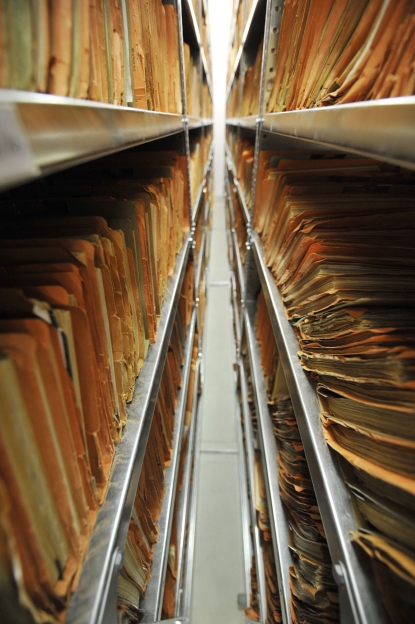 View of hundreds of files in the archives of the former East German secret police, known as the Stasi in Berlin on June 22, 2009. (AFP / John Macdougall)
View of hundreds of files in the archives of the former East German secret police, known as the Stasi in Berlin on June 22, 2009. (AFP / John Macdougall)After the wall fell and GDR imploded, I stayed on with AFP — I was a repository of information on things in East Germany and I really enjoyed this new work, helping correspondents write about the changes taking place.
I can’t say that I miss the GDR. Not at all! I belong to those East Germans who came out better following the reunification. There were many who found themselves out of a job, without the security that they had in GDR. You could understand them — it’s hard to enjoy freedom when you live in poverty and your quality of life is worse than before. I was lucky to avoid that fate.
My children today have so many opportunities that they would never have had if GDR had remained.
But on many points, East Germany came out worse after reunification. I saw this clearly, so I wasn’t overcome with emotion on October 3, 1990, when the two Germanys officially reunited.
This blog was written with Yannick Pasquet in Berlin and Yana Dlugy in Paris.
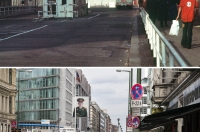
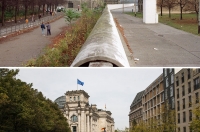
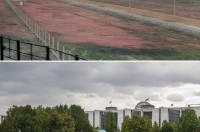
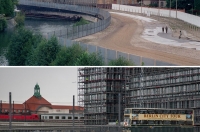
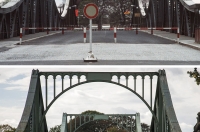
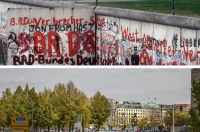
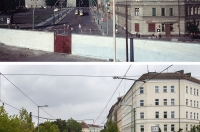
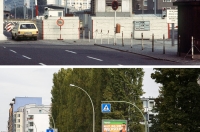
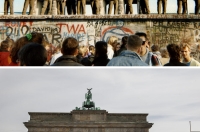
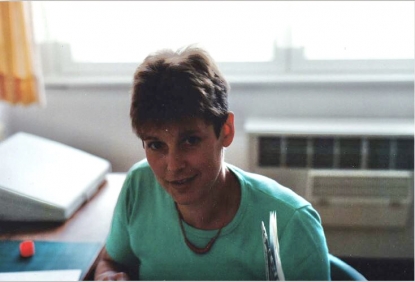 The author in August, 1988 (Photo courtesy of Sabine Nickel)
The author in August, 1988 (Photo courtesy of Sabine Nickel)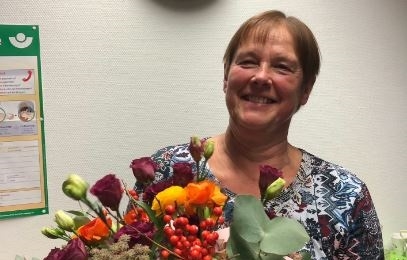 The author in 2018, when she retired from AFP after more than 30 years. (Photo courtesy of Sabine Nickel)
The author in 2018, when she retired from AFP after more than 30 years. (Photo courtesy of Sabine Nickel)



